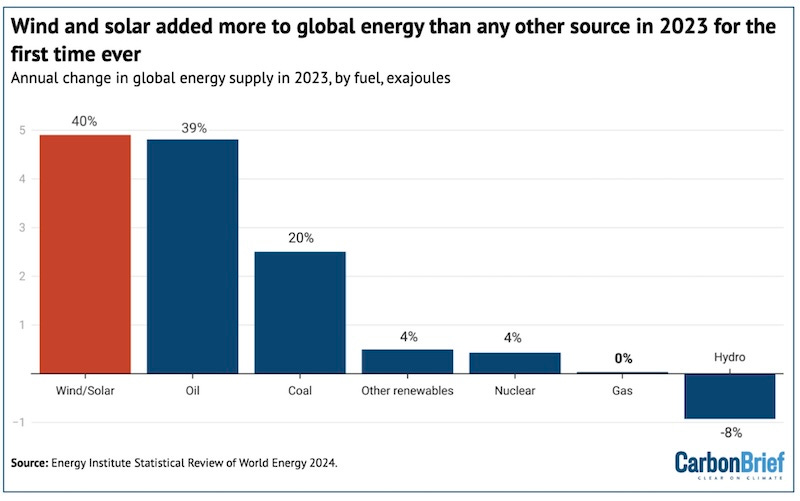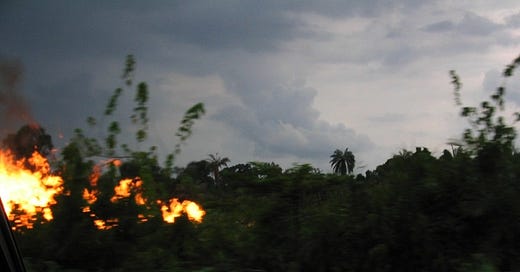Zero Corporate Responsibility
Shell's reckless practices in the Niger Delta are the "ultimate exploitation", says whistleblower and former safety consultant Caroline Dennett. But first, a very few words from the Pathways Alliance.
This week we’re passing the mic to Caroline Dennett, a former operational safety consultant to global oil and gas major Shell who publicly fired her client two years ago and became a whistleblower against the company’s front-line practices, in Nigeria and other countries. She published the original version of this post on LinkedIn on May 22, 2024.
But before we introduce Caroline, a story broke in Canada this past week that is extraordinary in its own right and connects back, indirectly, to the petrostate culture she encountered in her former job.
On Wednesday, the Parliament in Ottawa adopted the anti-greenwashing provisions in Bill C-59. On Thursday, the Pathways Alliance, whose six members account for about 95% of Canada’s oil sands production, scrubbed its website. Completely. Burned it to the ground. There’s nothing left but a three-paragraph statement asking the federal Competition Bureau for “clarity” on what messaging it can publish without violating the new law.
“Clarity”. A funny word, that. It’s the same one the industry uses when it doesn’t like the answer it gets after demanding billions of dollars in new taxpayer subsidies. Those would be the subsidies the Pathways companies say they need for precarious carbon capture and storage projects to decarbonize their operations.
Oh, but wait. Still with the theme of greenwash and truth-telling, the Canadian Association of Petroleum Producers likes to insist the subsidies the industry is lobbying for aren’t subsidies, just tax credits. Now CAPP, long known as the country’s “apex oil and gas lobby” has scaled back its website, too.
And yet…the provisions in C-59 aren’t onerous. They just call on companies across all sectors to model honesty and trust in an era that has far too little of either.
“This is basically a very modest provision in the Competition Act. It simply requires companies to tell the truth and to have an evidence base to back up their claims,” said Leah Temper, program director at the Canadian Association of Physicians for the Environment (CAPE). “So I do think this reaction is very telling.”
Truth-telling and corporate responsibility are essential through-lines that brings us back to Caroline Dennett’s account of her former client’s dismal environmental and human rights record in Nigeria. It’s been an easy enough story to obscure over the years and decades, with media everywhere in decline and generally giving higher priority to local or nearby stories than to international ones.
So now, back to Caroline, with a whistleblower’s story that we North Americans need very badly to hear.
Reckless by Choice
A month ago, I attended the Shell Investor AGM in London. This year I chose not to go inside, but to join fellow justice-seekers outside the Intercontinental Hotel in Greenwich, UK. I had the chance to speak at the event and this is what I said.
Shell operate exploitatively around the world, but they do it more in Nigeria than anywhere else I have witnessed.
And this approach is a choice. Shell choose to operate recklessly in Nigeria and the Niger Delta. It is the ultimate exploitation.
Have you ever wondered why the North Sea doesn’t look like the Niger Delta? Polluted beyond recognition from its pre-Shell Edenesque self?
It’s down to regulation and operational standards. Shell do not give a toss about standards in the Niger Delta. For decades they have actively coerced successive governments to go soft on regulation and legislation that would protect the people and environment in oil-bearing communities. This has led to clear-cut cases of ecocide, and arguably cases of genocide, particularly against Ogoniland and its people.
The devastation from Shell’s exploitation has been described as like "the fallout from a war zone, without the ready presence of international media to document it."
The Niger Delta is a Sacrifice Zone
I'd like to speak about how that devastation manifests, not historically, but right here, right now.
Here’s a snapshot of what it is like, from my research and observations over 12 years as an insider and an outsider.
Around two million people are living within three miles of gas flaring sites across Nigeria. Exposed to the black fumes and toxic smoke they emit, to their excessive heat and roaring noise. Imagine that.
In communities close to gas flaring, residents frequently report respiratory problems, severe skin rashes and eye irritations, and worse, increased cancers, health problems experienced by over two-thirds of the population there.
If you want more facts and figures, then know that the average life expectancy in the oil and gas-bearing communities in the Niger Delta is just 41 years, 10+ years below the national average. Amongst this gathering, that means about half of us would already be dead, including myself. Imagine that.
Know that conceiving a child within seven miles of an oil spill site increases neo-natal and infant mortality by 100%.
These are not just numbers. they are real people, with lives and loves, and families, and communities around them.
Like Alice, a community leader, who says:
Our lives will never be the same because of Shell’s gas flaring.
Gas flares have destroyed everything we have in this community, the flares are an oppression. Oil spills have caused massive destruction. Our rivers polluted, families have been robbed of fishing, their main source of livelihood. The water is no longer safe to drink or able to support farming, but there is no choice for us.
Imagine that.
Like Amara and her five-month-old baby, Paul. Whose cries pierce the silence of midnight, unable to breath properly, who coughs heavily through until daybreak. Gas flaring operations nearby have caused the young babe to suffer bronchitis. But they just have to live with it because "we have nowhere else to go".
Imagine that.
Like the fisherwomen and farmers who say:
“Oil is a curse.”
Because the pollution from Shell spills and flaring have killed fish stocks and destroyed the fertility of their soil. And then here comes climate change, with severe flooding, another curse from Shell.
Imagine that.
And like the Shell Nigeria workers, who raised the same concerns to me over and over, across locations and time. Resources stretched to the breaking point, unsafe levels of production pressure, understaffing, cutbacks, neglected maintenance, fears for a major catastrophic incident, and exploited local contractors going unpaid for months, pleading for help to prevent their families starving.
And even reports of people dying on the job, in their words
“worked to death.”
But Shell don’t care. It’s all just collateral damage to them, backed by their greedy investors and shareholders, in their pursuit of obscene and extreme profits.
Damage they now walk away from.
Because right now Shell are selling their onshore oil production in Nigeria. They do so in the hope they can avoid accountability and legal liability for their 70-year-long harms.
But they can’t run and dodge and hide forever.
Justice is coming…and it will rain down heavily upon them.
We fight back. We fight back from our place of privilege and with love, and in solidarity with communities around the world who demand and stand for justice. For people, for planet, for a liveable future.
Chart of the Week

Montreal Adds Nine More Car-Free Streets after ‘Mind Blowing’ Success
Oil Sands Lobby Scrubs Website After Greenwashing Curbs Pass Parliament
Scale Back Gas Networks or Face Higher Costs, Stranded Assets, Climate Institute Warns Provinces
Ontario Bars Solar on Prime Farmland, Misses Middle Ground in Agrivoltaics
Ontario’s New Overnight Power Price Is ‘Rocket Fuel’ for Rooftop Solar
Humidex Could Hit 45°C as Heat Dome Settles Over Eastern Canada, U.S.
U.S. Refiners Complain About Poor-Quality Oil from Trans Mountain Pipeline
Haisla Vote to Join Cedar LNG Project Despite Looming Global Surplus
Canada Growth Fund Backs Carbon Capture System at Alberta Waste-to-Energy Project
A new law aims to crack down on environmental racism in Canada (Canadian Broadcasting Corporation)
Almost 2,000 children die every day from air pollution, report finds (The Guardian)
Fire near Churchill Falls still active Friday evening, but not moving closer to town (Canadian Broadcasting Corporation)
FLO raises $136M to commercialize, expand EV charging network (Sustainable Biz)
Key EV Battery Material Can Come From a Surprising Source: Methane (Bloomberg)
China's EV market is going global. Can U.S., Canada balance protectionism with reducing emissions? (Canadian Broadcasting Corporation)
Mosaic Forest Management’s BigCoast carbon credit project faces ‘crisis of confidence’ (Globe and Mail)
Report predicts Hudson Bay polar bears could disappear in a few decades (Canadian Broadcasting Corporation)
Swiss Re explores cascading effects of natural disasters and other key emerging risks (Climate Action)
Iceland has a climate president (Talking Climate)
French Senate Committee Calls for Immediate Ban of Russian LNG (Bloomberg)
As climate change imperils Taliban’s shift from opium, impact could be felt worldwide (Washington Post)







